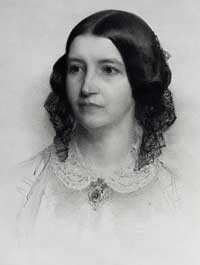Henry Wadsworth Longfellow
Henry Wadsworth Longfellow (February 27, 1807 – March 24, 1882) was an American poet and educator whose works include "Paul Revere's Ride", "The Song of Hiawatha", and "Evangeline". He was also the first American to translate Dante Alighieri's "Divine Comedy" and was one of the five members of the group known as the Fireside Poets. Longfellow was born in Portland, Maine, which was then still part of Massachusetts. He became a professor at Harvard University and was instrumental in shaping the cultural landscape of the United States in the nineteenth century.
Early Life[edit | edit source]
Henry Wadsworth Longfellow was born to Stephen Longfellow, a lawyer, and Zilpah (Wadsworth) Longfellow in Portland. He attended Portland Academy and later went to Bowdoin College, where he graduated in 1825 alongside future American President Franklin Pierce. After college, Longfellow traveled to Europe to study languages, a trip that greatly influenced his future works and career.
Career[edit | edit source]
Upon returning to the United States, Longfellow was offered a position to teach modern languages at Bowdoin College. He accepted and spent several years teaching and translating texts from European languages. In 1835, he accepted a position at Harvard University, which allowed him to travel again to Europe for further study before assuming his role.
Longfellow's literary career began to flourish while he was at Harvard. He published several textbooks and essays, but it was his poetry that captured the public's imagination. His poems often featured themes of myth, legend, and history, making them accessible and appealing to a wide audience. "The Song of Hiawatha", published in 1855, and "Evangeline", published in 1847, are among his most celebrated works.
Personal Life[edit | edit source]
Longfellow married twice. His first wife, Mary Storer Potter, died in 1835 after a miscarriage. In 1843, he married Frances Appleton, who died tragically in a fire in 1861. These personal tragedies deeply affected Longfellow, and themes of loss and longing are prevalent in his later works.
Legacy[edit | edit source]
Henry Wadsworth Longfellow's impact on American literature and culture cannot be overstated. He was among the first American poets to earn a living solely through his writing, and his works were immensely popular both in the United States and abroad. His poems contributed to the shaping of the American identity and were instrumental in the development of American literature.
Longfellow's home in Cambridge, Massachusetts, has been preserved as a museum, and his birthday is celebrated as part of Portland's annual Longfellow Days. His influence extends beyond literature; schools, bridges, and parks across the country bear his name, a testament to his enduring legacy in American culture.
This article is a literature-related stub. You can help WikiMD by expanding it!
Search WikiMD
Ad.Tired of being Overweight? Try W8MD's NYC physician weight loss.
Semaglutide (Ozempic / Wegovy and Tirzepatide (Mounjaro / Zepbound) available. Call 718 946 5500.
Advertise on WikiMD
|
WikiMD's Wellness Encyclopedia |
| Let Food Be Thy Medicine Medicine Thy Food - Hippocrates |
Translate this page: - East Asian
中文,
日本,
한국어,
South Asian
हिन्दी,
தமிழ்,
తెలుగు,
Urdu,
ಕನ್ನಡ,
Southeast Asian
Indonesian,
Vietnamese,
Thai,
မြန်မာဘာသာ,
বাংলা
European
español,
Deutsch,
français,
Greek,
português do Brasil,
polski,
română,
русский,
Nederlands,
norsk,
svenska,
suomi,
Italian
Middle Eastern & African
عربى,
Turkish,
Persian,
Hebrew,
Afrikaans,
isiZulu,
Kiswahili,
Other
Bulgarian,
Hungarian,
Czech,
Swedish,
മലയാളം,
मराठी,
ਪੰਜਾਬੀ,
ગુજરાતી,
Portuguese,
Ukrainian
Medical Disclaimer: WikiMD is not a substitute for professional medical advice. The information on WikiMD is provided as an information resource only, may be incorrect, outdated or misleading, and is not to be used or relied on for any diagnostic or treatment purposes. Please consult your health care provider before making any healthcare decisions or for guidance about a specific medical condition. WikiMD expressly disclaims responsibility, and shall have no liability, for any damages, loss, injury, or liability whatsoever suffered as a result of your reliance on the information contained in this site. By visiting this site you agree to the foregoing terms and conditions, which may from time to time be changed or supplemented by WikiMD. If you do not agree to the foregoing terms and conditions, you should not enter or use this site. See full disclaimer.
Credits:Most images are courtesy of Wikimedia commons, and templates, categories Wikipedia, licensed under CC BY SA or similar.
Contributors: Prab R. Tumpati, MD




